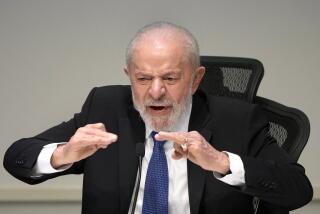Brazilians Vote; Polls Favor Sarney
RIO DE JANEIRO — Latin America’s largest nation, poised as ever between misery and splendor, took a major step toward full democracy Saturday in buoyant national elections expected to endorse the developmentalist policies of an accidental president.
About 69 million voters--more than those in all the rest of South America’s nations combined--chose governors and legislators in 23 states and 547 members of congress in Brazil’s first parliamentary elections since the end of a two-decade-long military dictatorship.
Their verdict will determine the longevity of the moderate, free-market government of President Jose Sarney and the political and economic direction of a tropical colossus aiming for full membership in the developed world by century’s end.
With official counting of complicated paper ballots to begin in earnest this morning, exit polls Saturday night showed the government at least retaining a comfortable majority in both houses of congress. Sarney’s supporters were also favored in 20 of the 23 gubernatorial races.
Vow of Progress
“I will be the last president of an underdeveloped Brazil,” Sarney has vowed. Among the provisions of a new constitution to be written by the National Congress chosen Saturday will be the length of the presidential term.
Sarney, a poetry-writing “old pol,” unexpectedly became president 18 months ago when Tancredo Neves, chosen in indirect elections as a transition candidate ending military rule, fell mortally ill on the eve of his inauguration.
The success of Sarney’s economic policies since then has made the government’s two-party coalition a favorite to improve its majority in congress.
“We have made a transition to democracy, but we have still to create a democratic regime,” the 56-year-old Sarney said on election eve. “The passage to democracy is still not finished. There is liberty in the heart of the people but not in the institutions. There is a whole new world to build.”
‘Modern Capitalism’
Calling for “modern capitalism,” Sarney has urged a diminished role for the state in the Brazilian economy.
Sarney’s name was not on the ballot Saturday, and neither was that of leftist presidential aspirant Leonel Brizola, the outgoing governor of Rio de Janeiro state, but their proxies dueled in a Rio vote split along economic lines.
Government gubernatorial candidate Wellington Moreira Franco, a French-educated former town mayor supported by 12 parties, ran well in middle-class neighborhoods. The strength of opponent Darcy Ribeiro, a leftist intellectual and former education minister, lay among the poor. Exit polls gave Moreira Franco a lead of 42% to 38%.
“The people are becoming more and more sick with the treatment they are being given,” Brizola charged in support of Ribeiro’s campaign. “The rich get richer, and the poor get poorer.”
Rich-Poor Gap
Sarney’s opponents call for greater efforts to narrow the rich-poor gap in a country where the glitter of the industrialized Rio-Sao Paulo-Minas Gerais region masks grinding backlands poverty where Africa-level standards of nutrition, public health and literacy are common.
A second bellwether race in Sao Paulo, the largest of Brazil’s states and home to 16 million voters, pitted government favorite Orestes Quercia against Antonio Ermirio de Moraes, a liberal industrialist representing the government’s coalition partner, and conservative Paulo Maluf, a presidential candidate defeated by Neves in 1985. Quercia had a comfortable lead, according to exit polls and scattered early returns.
With 25 of the 30 parties involved in Saturday’s balloting less than two years old, campaigning among 15,000 candidates for 1,535 jobs nationwide was carried out with more imprecation than subtlety. Issues, particularly the shape of the new constitution, usually were subordinated to personalities.
In Sao Paulo, the gubernatorial candidates referred to their opponents only by epithet: “the bad boss,” “the crook,” “the exploiter.” Around the country, candidates accused their opponents--sometimes accurately--of enjoying the support of former torturers, embezzlers and underworld bosses. One leftist congressional candidate in Sao Paulo dressed entirely in white “to deplore the filth” of his opponents.
Favored in Straw Poll
The first returns Saturday came in the form of a straw poll of well-paid professional soccer players who mostly favored the Establishment candidate Moreira Franco. Environmentalist Fernando Gabeira, a former urban guerrilla who helped kidnap American Ambassador Charles Burke Elbrick in 1969 and was later shot and tortured by Brazilian police, ran as a dark horse in the Rio governor’s race.
Saturday’s vote came in the context of a soaring economic boom that favored the government candidates.
In February, Sarney surprised Brazil with a Draconian anti-inflationary measure called the Cruzado Plan after the new currency it created. Freezing prices and wages, the plan has reduced inflation, which was 255% in 1985, to 10.2% since its announcement.
Success of the plan has stimulated the best growth in more than a decade.
More to Read
Sign up for Essential California
The most important California stories and recommendations in your inbox every morning.
You may occasionally receive promotional content from the Los Angeles Times.









